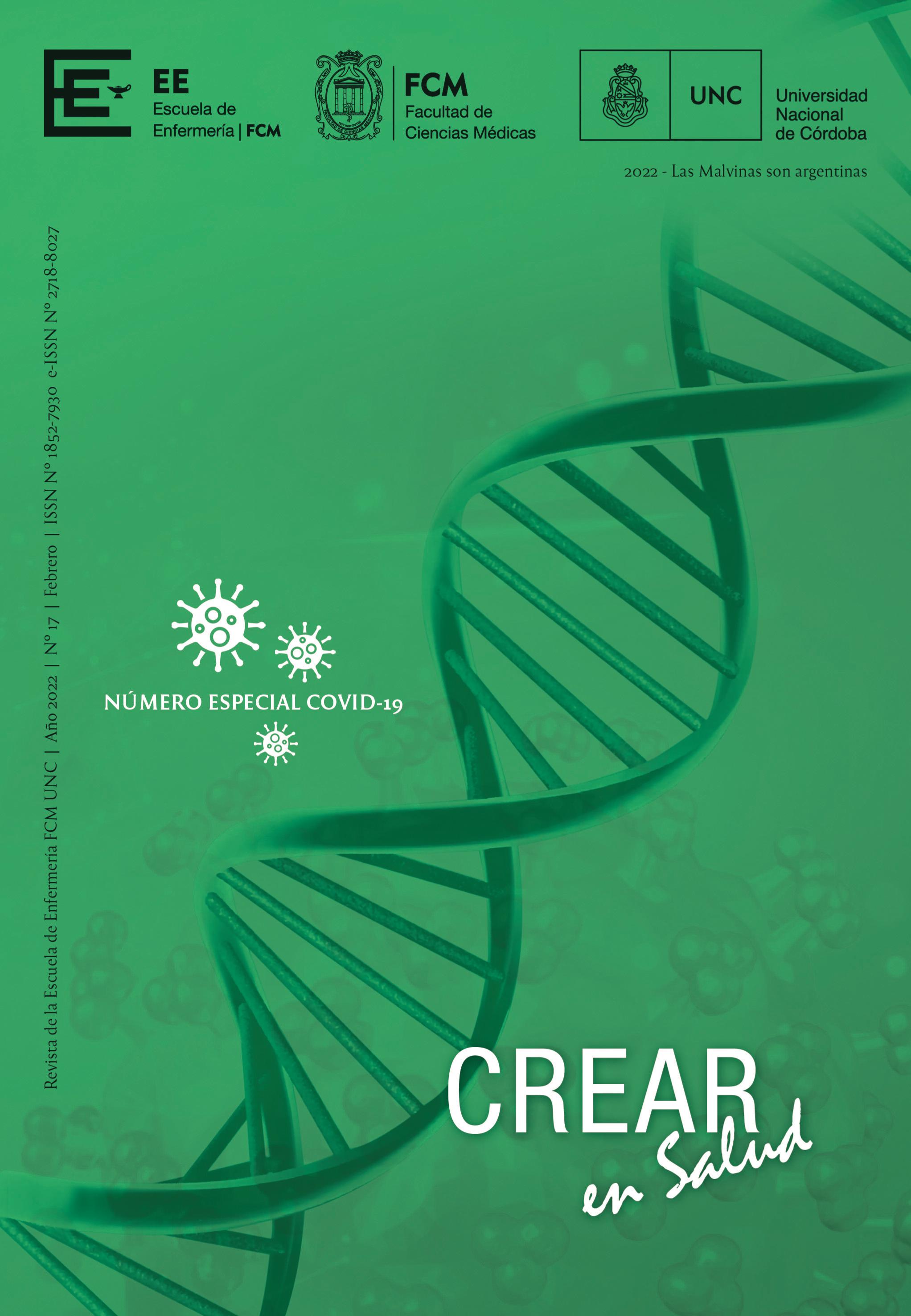Nursing in its dual family and professional role, how does it adapt to the demands in this Covid-19 pandemic?
Keywords:
nursing, covid 19, family, professional practice.Abstract
ABSTRACT
Introduction: The health emergency generated by the COVID-19 pandemic has produced changes in the lives of nursing professionals, this situation being a trigger for family moments that she was forced to attend to and face. The objective of the study was to establish the adaptations to professional and family life in the framework of the COVID-19 pandemic made by second-cycle student nurses. Cordoba-Jujuy, Argentina. 2020. The study was qualitative. The population made up of students of the second cycle of the Bachelor of Nursing career at the National University of Córdoba. It seeks to obtain findings from subdimensions; adaptations: “professional life and family life in the framework of a pandemic”, The sample was intentional until it was saturated, through direct virtual interviews via MEET or ZOOM, on the selected topics, textual expressions of the actors and Also, observations. Results of the findings similarities and differences are established, articulation was established between theory and experience that responds to the objectives and questions raised in the investigation. Findings, in Dimension 1: regarding how the family nucleus is constituted, the responses are diverse because simple and extended family nuclei are included; It should be noted that, in order to preserve the health of the family, nurses are the first to reach the extreme of caring for them, even if this means that they will have to leave home or plunge into isolation within their own homes. In Dimension 2: adaptations to professional life manifest breaking ties physically, many schedule changes, we were forced to make adjustments of all kinds; and achievements in aspects such as stress management, anxiety and relationships in nursing. Conclusions: They have seen themselves in the position of changing habits in their lifestyle as a result of the pandemic, finding themselves, on occasions as they expressed, involved in stressful situations in the professional, family and social spheres
References
REFERENCIAS BIBLIOGRÁFICAS
Callista Roy. (2000). El modelo de adaptación de Roy en el contexto de los modelos de enfermería, con ejemplos de aplicación y dificultades. Revista, Cultura de los cuidados, (2)139-159. https://rua.ua.es › bitstream › CC_07-08_17
Castillo Villanueva, L., y Velázquez-Torres, D. (2015). Sistemas complejos adaptativos, sistemas socio-ecológicos y resiliencia. Revista Quivera, (17)2, 11-32. https://quivera.uaemex.mx/article/view/9811/8089
Cid Rodríguez, M. del C., Montes de Oca Ramos, R., y Hernández Díaz, O. (2014). La familia en el cuidado de la salud. Revista, Médica Electrónica, 36(4), 462-472. http://scielo.sld.cu/scielo.php?script=sci_arttext&pid=S1684-18242014000400008&lng=es&tlng=es
Consejo Internacional de Enfermería (2020). El CIE envía un mensaje de apoyo a las enfermeras que están combatiendo el coronavirus en China y en otros lugares. https://www.icn.ch/es/noticias/el-cie-envia-un-mensaje-de-apoyo-las-enfermeras-que-estan-combatiendo-el-coronavirus-en
Del Valle, M., López Morales, H., Andrés, M.L., Canet Juri, L., Yerro Avincetto, M., y Urquijo, S. (2020). Intolerancia a la incertidumbre generada por la pandemia de COVID-19 y niveles de depresión y ansiedad. http://hdl.handle.net/11336/133369
Díaz de Flores, L., Durán de Villalobos, M. M., Gallego de Pardo, P., Gómez Daza, B., Gómez de Obando, E., González de Acuña, Y., Gutiérrez de Giraldo, M. del C., Hernández Posada, Á., Londoño Maya, J. C., Moreno Fergusson, M. E., Pérez Giraldo, B., Rodríguez Carranza, C., Rozo de Arévalo, C., Umaña de Lozano, C., Valbuena, S., Vargas Márquez, R., y Venegas Bustos, B. C. (2002). Análisis de los conceptos del modelo de adaptación de Callista Roy. Revista Aquichan, 2(1), 19-23. http://www.scielo.org.co/scielo.php?script=sci_arttext&pid=S1657-59972002000100004
Espinosa González, L. (2004). Cambios del modo y estilo de vida; su influencia en el proceso salud-enfermedad. Revista Cubana de Estomatología, 41(3). http://scielo.sld.cu/scielo.php?script=sci_arttext&pid=S0034-75072004000300009&lng=es&tlng=es.
Fondo de las Naciones Unidas para la Infancia. (UNICEF). 2020. Cómo pueden los progenitores ayudar a sus hijos a sobrellevar las pérdidas que ocasiona la COVID-19. Entrevista y artículo de Mandy Rich, redactora de contenidos digitales de UNICEF. https://www.unicef.org/es/coronavirus/como-pueden-progenitores-ayudarhijos-sobrellevar-perdidas-por-COVID19.
Ministerio de salud de la Nación Argentina. Gobierno de la Provincia de Buenos Aires. Anexo. (2020). Protocolos y recomendaciones implementadas en el marco de la Pandemia del COVID-19. https://portalcoronavirus.gba.gob.ar/docs/informe_bicameral/ANEXO%20Protocolos%20y%20recomendaciones%20PBA%20vigentes%20-%2021-04.pdf
Ministerio de Salud del Perú. (2020). Es necesario aplicar las medidas de bioseguridad en nuestra vida diaria, para cuidar nuestra salud. http://www.hhv.gob.pe/notas-prensa/es-necesario-aplicar-las-medidas-debioseguridad-en-nuestra-vida-diaria-para-cuidar-nuestra-salud/
Organización Mundial de la Salud. (2020). Situación de Enfermería en la Región de la Américas en tiempos de la pandemia COVID-19. https://www.paho.org/journal/es/articulos/situacion-enfermeria-mundo-region-americas-tiempos-pandemia-covid-19
Pérez Calviño, R. M., Carbonell Pérez, R., y Martínez, D. A. (2014). Papel de la familia en el fortalecimiento de la salud familiar. Revista EFDeportes, 19(198). https://www.efdeportes.com/efd198/papel-de-la-familia-en-la-salud.htm
Prieto Barboza, E. A. (2013). Resiliencia y panarquía: claves para enfrentar la adversidad en sistemas sociales. Revista Multiciencias, 13(1), 23-29. https://www.redalyc.org/articulo.oa?id=90428348007
Saborío Morales, L., e Hidalgo Murillo, L. F. (2015). Síndrome de Burnout. Revista Medicina Legal de Costa Rica, 32(1), 119-124. https://www.scielo.sa.cr/scielo.php?pid=S1409-00152015000100014&script=sci_abstract&tlng=es
Salazar Arango, A. y Dacanay, J (2015). Proceedings of the Second International Conference Family and Society (September 24-25, 2014). II International ConferenceFamily and Society Proceedings edited by Rita Cavallottiand Consuelo León Barcelona, Institut d´EstudisSuperiors de la Família. https://www.academia.edu/15185170/Proceedings_of_the_Second_International_Conference_Family_and_Society_September_24_25_2014_
Tena Dávalos, J., y Pérez Álvarez, B. E. (2017). Estrategias de interpretación de oraciones relativas con doble antecedente en español. Revista Nueva revista de filología hispánica, 65(1), 3-25. https://doi.org/10.24201/nrfh.v65i1.2827
Universidad Nacional de Córdoba. Universitaria de Buenos Aires. (2020). La universidad entre la crisis y la oportunidad. Reflexiones y acciones del sistema universitario argentino ante la pandemia. Universidad Nacional de Mar del Plata. Facultad de Ciencias Económicas y Sociales. Tecnicatura para periodismo digital. Laboratorio de Redacción para medios digitales. (MediaLab 2021). El trabajo y la Familia, dinámicas alteradas por la pandemia. https://portaluniversidad.org.ar/index.php/2021/08/13/el-trabajo-y-la-familia-dinamicas-alteradas-por-la-pandemia/
Vargas Melgarejo, L. M. (1994). Sobre el concepto de percepción. Revista Alteridades, 4(8), 47-53. https://www.redalyc.org/articulo.oa?id=74711353004
Downloads
Published
Issue
Section
License

This work is licensed under a Creative Commons Attribution-NonCommercial 4.0 International License.



